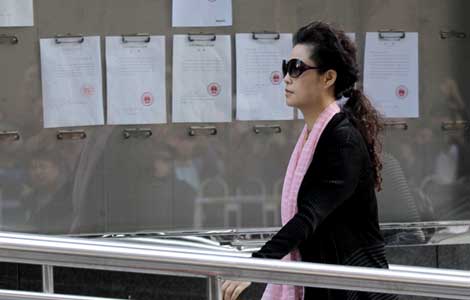Court passes its test
Updated: 2013-09-27 07:01
(China Daily)
|
||||||||
The first-instance court in Beijing delivers a guilty verdict in a gang rape case. One of the five defendants sticking to his not guilty claim says he will appeal.
Just another case; had one defendant, a 17-year-old boy, not been the notorious son of two celebrity army singers; had he not just completed 12 months in a juvenile correction center for mayhem; and had there not been obvious attempts to manipulate public opinion.
From the very beginning, this case was destined to be sensational and sensationalized. It had all the elements of a juicy scandal and the protracted hoopla surrounding it incorporated lies, rumors, and conspiracy plot theories, along with accusations of failed parenting and celebrity privileges, and allegations about the victim.
And the reaction to the verdict was predetermined. No matter whether the defendants were found guilty or not, there would be loud complaints given the tense division in public perceptions of the case.
The rest of the story has by and large been a test of the court's impartiality. Given the fierce war of words in and outside the courtroom, there have been plenty of episodes and factors that could have compromised its independent judgment.
Most difficult of all, the judges have had to navigate the complicated artificial barriers presented by the case.
Would the celebrity background of one of the defendants, not to mention the fact that the celebrity mother's insistence on her son's innocence meant she would be unable to swallow a guilty judgment, be an influence on the court's considerations? Were there attempts to conceal the identity of other suspects? Would the allegations about the victim influence the definition of the offense? And, last of all, would the strong and polarized public opinions undermine judicial independence?
The People's Court of Haidian District in Beijing has demonstrated impressive professionalism throughout.
The court responded to the public concerns via its micro blog and finally in its decision. Its explanation of its verdict, in particular, is a fine example of jurisprudential reasoning that answers the most commonly asked questions about the case.
It qualifies as a piece of textbook material in legal awareness, at least for reaffirming the legal commonsense that rape is rape, no matter the identity of the victim.
But with an appeal pending, the test of impartiality is not yet over.
(China Daily 09/27/2013 page8)

 US astronaut praises China's space program
US astronaut praises China's space program
 Christie's holds inaugural auction
Christie's holds inaugural auction
 Aviation gains from exchanges
Aviation gains from exchanges
 Early fish ancestor found
Early fish ancestor found
 Singers' son sentenced to 10 years for rape
Singers' son sentenced to 10 years for rape
 Djokovic announces engagement to girlfriend
Djokovic announces engagement to girlfriend
 Taipei, LA and Singapore top travel search growth list
Taipei, LA and Singapore top travel search growth list
 Big cats are part of the family
Big cats are part of the family
Most Viewed
Editor's Picks

|

|

|

|

|

|
Today's Top News
Russia to guard Syria chemical weapon destruction
Interpol issues arrest notice for 'white widow'
US astronaut praises China's space program
Joint talks on trade in services
Philippines-US drill raises concern
Abe blames China for defense spending
Courier reaches for the sky with drone
President Xi touts moral models
US Weekly

|

|






